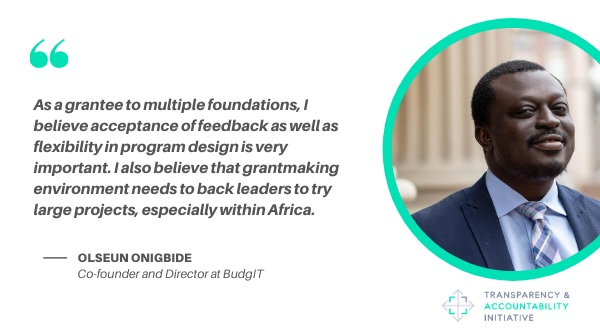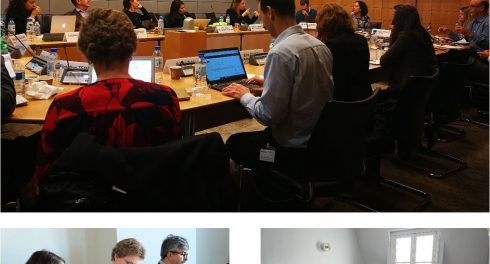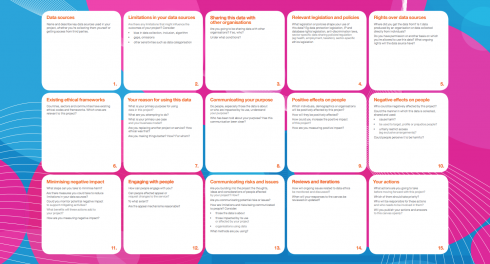Fiscal transparency advocate and confessed “accidental” development worker, Oluseun Onigbide, is a firm believer in the power of open data and tech for social change. As the Co-founder and Director of BudgIT, a civic organization that workers to foster social change through technology, citizen engagement, and institutional improvement, Oluseun and his team use co-creation mechanisms, tweets, and infographics to simplify policy project, track service delivery, and engage policymakers in Nigeria, Sierra Leone, Liberia, and Ghana.
We sat with Oluseun to discuss the highs and lows of working on fiscal transparency in Africa; what grantees want from funders, and the importance of collaboration in using technology to break down rigid systems.
Watch the full interview above and read the highlights below:
When did you first know you wanted to work on the issue of governance and fiscal transparency?
I never wanted to work on fiscal transparency. I usually refer to myself as an accidental advocate. I was a young banker who believed that I could share my public finance knowledge with citizens. I believe that budgets and related issues should be common knowledge and every citizen should be able to ask fact-based questions. I was lucky to meet the great people from Co-Creation Hub, who fully supported the incubation of the idea.
 BudgIT has gone from being an answer to a challenge hackathon to an organization synonymous with fiscal transparency. What have been the highs and lows of using technology to promote fiscal transparency in Africa, especially in Nigeria?
BudgIT has gone from being an answer to a challenge hackathon to an organization synonymous with fiscal transparency. What have been the highs and lows of using technology to promote fiscal transparency in Africa, especially in Nigeria?
It has been a great story so far. I am always excited to see the disbelief at the possibilities that have been enabled by our work. The highs for me include the ability to reach over 15m Nigerians on budgeting in Nigeria, capacity building for government institutions and improved gains in subnational transparency due to work. However, there are low points when governments delegitimise our work by casting aspersions on our intentions and situations where our project officers have been arrested by notorious police units.
Arguably, tech innovations are one of the critical answers to the world’s biggest social challenges. As the creator/leader of one, what recommendation would you give anyone intending to create a technology enterprise for social good? In retrospect, what recommendations/ advice would you give yourself when you are starting out on this TPA journey?
My advice for developers of social good is to develop the fortitude with the belief that change will happen, but will require rigorous work and finding partners who are willing to accept change. I reflect on the early days when it seemed like BudgIT would never work but what prevails, in the end, is tenacity as well standing by strong values. I will also advise new leaders to seek valuable partnerships and be open to continuously learning – that is essential to innovate rapidly.
What do grantees want from funders in regards to having a smarter grantmaking relationship?”
As a grantee to multiple foundations, I believe acceptance of feedback as well as flexibility in program design is very important. As an organization leader, I like to be open to funders on the current status of projects and also the evolving context that might affect results. I also believe that grantmaking environment needs to back leaders to try large projects, especially within Africa.
2020 has been a remarkable (and disruptive) year for everyone. What lessons are you taking into 2021?
I am accepting the new world of remote work and the need to place a priority on the health of those that work within the organization. I am intrigued by how much changes we have made to work environment policy in BudgIT in 2020.


